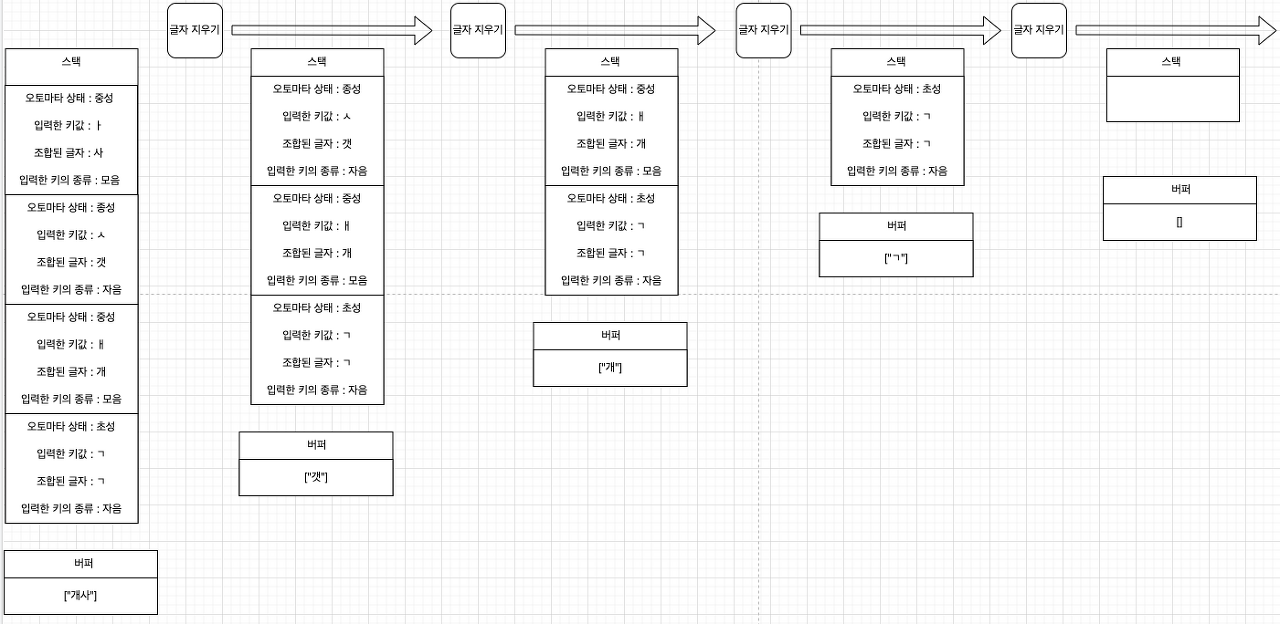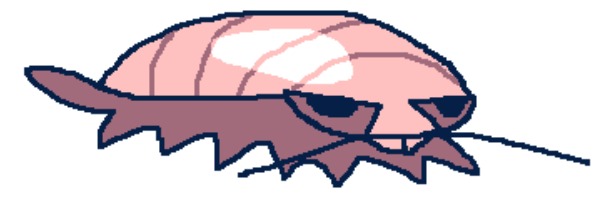처음 Keyboard Extension으로 키보드 확장 프로그램을 개발 할 때 한글 조합이 알아서 되는줄 알았지만, 스스로 조합이 되지 않았다. 안드로이드는 자동으로 조합을 해주는데 ios에서는 스스로 알고리즘을 만들어야 합니다.. 오토마타에 관해 전공수업을 들었어서 한글 오토마타를 구상, 알고리즘으로 구현해보았습니다.
일단 알고리즘을 제작하기전 오토마타 그래프를 만들었습니다.

알고리즘을 구현하는데 Stack을 사용해서 한글을 지울때 이전 상태로 돌아가서 다음 상태로 이동할 수게 구현해서 처음부터 한글을 조합하는 작업을 하지 않아도 되서 좀 더 효율적인 알고리즘으로 구현했습니다. 메멘토 패턴을 이용한것이라 볼 수 있습니다.
enum HangulStatus {
case start //s0
case chosung //s1
case joongsung, dJoongsung //s2,s3
case jongsung, dJongsung //s4, s5
case endOne, endTwo //s6,s7
}
//입력된 키의 종류 판별 정의
enum HangulCHKind {
case consonant //자음
case vowel //모음
}
//키 입력마다 쌓이는 입력 스택 정의
struct InpStack {
var curhanst: HangulStatus //상태
var key: UInt32 //방금 입력된 키 코드
var charCode: String //조합된 코드
var chKind: HangulCHKind // 입력된 키가 자음인지 모임인지
}
final class HangulAutomata {
var buffer: [String] = []
var inpStack: [InpStack] = []
var currentHangulState: HangulStatus?
private var chKind = HangulCHKind.vowel
private var charCode: String = ""
private var oldKey: UInt32 = 0
private var oldChKind: HangulCHKind?
private var keyCode: UInt32 = 0
private var chosungTable: [String] = ["ㄱ","ㄲ", "ㄴ", "ㄷ", "ㄸ", "ㄹ", "ㅁ", "ㅂ", "ㅃ", "ㅅ", "ㅆ", "ㅇ", "ㅈ", "ㅉ", "ㅊ", "ㅋ", "ㅌ", "ㅍ", "ㅎ"]
private var joongsungTable: [String] = ["ㅏ", "ㅐ", "ㅑ", "ㅒ", "ㅓ", "ㅔ", "ㅕ", "ㅖ", "ㅗ", "ㅘ", "ㅙ", "ㅚ", "ㅛ", "ㅜ", "ㅝ", "ㅞ", "ㅟ", "ㅠ", "ㅡ", "ㅢ", "ㅣ"]
private var jongsungTable: [String] = [" ", "ㄱ", "ㄲ", "ㄳ", "ㄴ", "ㄵ", "ㄶ", "ㄷ", "ㄹ", "ㄺ", "ㄻ", "ㄼ", "ㄽ", "ㄾ", "ㄿ","ㅀ", "ㅁ", "ㅂ", "ㅄ", "ㅅ", "ㅆ", "ㅇ", "ㅈ", "ㅊ", "ㅋ", "ㅌ", "ㅍ", "ㅎ"]
private var dJoongTable: [[String]] = [
["ㅗ","ㅏ","ㅘ"],
["ㅗ","ㅐ","ㅙ"],
["ㅗ","ㅣ","ㅚ"],
["ㅜ","ㅓ","ㅝ"],
["ㅜ","ㅔ","ㅞ"],
["ㅜ","ㅣ","ㅟ"],
["ㅡ","ㅣ","ㅢ"],
["ㅏ","ㅣ","ㅐ"],
["ㅓ","ㅣ","ㅔ"],
["ㅕ","ㅣ","ㅖ"],
["ㅑ","ㅣ","ㅒ"],
["ㅘ","ㅣ","ㅙ"]
]
private var dJongTable: [[String]] = [
["ㄱ","ㅅ","ㄳ"],
["ㄴ","ㅈ","ㄵ"],
["ㄴ","ㅎ","ㄶ"],
["ㄹ","ㄱ","ㄺ"],
["ㄹ","ㅁ","ㄻ"],
["ㄹ","ㅂ","ㄼ"],
["ㄹ","ㅅ","ㄽ"],
["ㄹ","ㅌ","ㄾ"],
["ㄹ","ㅍ","ㄿ"],
["ㄹ","ㅎ","ㅀ"],
["ㅂ","ㅅ","ㅄ"]
]
private func joongsungPair() -> Bool {
for i in 0..<dJoongTable.count {
if dJoongTable[i][0] == joongsungTable[Int(oldKey)] && dJoongTable[i][1] == joongsungTable[Int(keyCode)] {
keyCode = UInt32(joongsungTable.firstIndex(of: dJoongTable[i][2]) ?? 0)
return true
}
}
return false
}
private func jongsungPair() -> Bool {
for i in 0..<dJongTable.count {
if dJongTable[i][0] == jongsungTable[Int(oldKey)] && dJongTable[i][1] == chosungTable[Int(keyCode)] {
keyCode = UInt32(jongsungTable.firstIndex(of: dJongTable[i][2]) ?? 0)
return true
}
}
return false
}
private func isJoongSungPair(first: String, result: String) -> Bool {
for i in 0..<dJoongTable.count {
if dJoongTable[i][0] == first && dJoongTable[i][2] == result {
return true
}
}
return false
}
private func decompositionChosung(charCode: UInt32) -> UInt32 {
let unicodeHangul = charCode - 0xAC00
let jongsung = (unicodeHangul) % 28
let joongsung = ((unicodeHangul - jongsung) / 28) % 21
let chosung = (((unicodeHangul - jongsung) / 28) - joongsung) / 21
return chosung
}
private func decompositionChosungJoongsung(charCode: UInt32) -> UInt32 {
let unicodeHangul = charCode - 0xAC00
let jongsung = (unicodeHangul) % 28
let joongsung = ((unicodeHangul - jongsung) / 28) % 21
let chosung = (((unicodeHangul - jongsung) / 28) - joongsung) / 21
return combinationHangul(chosung: chosung, joongsung: joongsung, jongsung: keyCode)
}
private func combinationHangul(chosung: UInt32 = 0, joongsung: UInt32, jongsung: UInt32 = 0) -> UInt32 {
return (((chosung * 21) + joongsung) * 28) + jongsung + 0xAC00
}
func deleteBuffer() {
if inpStack.count == 0 {
if buffer.count > 0 {
buffer.removeLast()
}
} else {
if let popHanguel = inpStack.popLast() {
if popHanguel.curhanst == .chosung {
buffer.removeLast()
} else if popHanguel.curhanst == .joongsung || popHanguel.curhanst == .dJoongsung {
if inpStack[inpStack.count - 1].curhanst == .jongsung || inpStack[inpStack.count - 1].curhanst == .dJongsung {
buffer.removeLast()
}
buffer[buffer.count - 1] = inpStack[inpStack.count - 1].charCode
} else {
if inpStack.isEmpty {
buffer.removeLast()
} else if popHanguel.chKind == .vowel {
if inpStack[inpStack.count - 1].curhanst == .jongsung {
if inpStack[inpStack.count - 1].chKind == .vowel {
if isJoongSungPair(first: joongsungTable[Int(inpStack[inpStack.count - 1].key)] , result: joongsungTable[Int(popHanguel.key)]) {
buffer[buffer.count - 1] = inpStack[inpStack.count - 1].charCode
} else {
buffer.removeLast()
}
}
} else {
buffer.removeLast()
}
} else {
buffer[buffer.count - 1] = inpStack[inpStack.count - 1].charCode
}
}
if inpStack.isEmpty {
currentHangulState = nil
} else {
currentHangulState = inpStack[inpStack.count - 1].curhanst
oldKey = inpStack[inpStack.count - 1].key
oldChKind = inpStack[inpStack.count - 1].chKind
charCode = inpStack[inpStack.count - 1].charCode
}
}
}
}
}
extension HangulAutomata {
func hangulAutomata(key: String) {
var canBeJongsung: Bool = false
if joongsungTable.contains(key) {
chKind = .vowel
keyCode = UInt32(joongsungTable.firstIndex(of: key) ?? 0)
} else {
chKind = .consonant
keyCode = UInt32(chosungTable.firstIndex(of: key) ?? 0)
if !((key == "ㄸ") || (key == "ㅉ") || (key == "ㅃ")) {
canBeJongsung = true
}
}
if currentHangulState != nil {
oldKey = inpStack[inpStack.count - 1].key
oldChKind = inpStack[inpStack.count - 1].chKind
} else {
currentHangulState = .start
buffer.append("")
}
//MARK: - 오토마타 전이 알고리즘
switch currentHangulState {
case .start:
if chKind == .consonant {
currentHangulState = .chosung
} else {
currentHangulState = .jongsung
}
case .chosung:
if chKind == .vowel {
currentHangulState = .joongsung
} else {
currentHangulState = .endOne
}
case .joongsung:
if canBeJongsung {
currentHangulState = .jongsung
} else if joongsungPair() {
currentHangulState = .dJoongsung
} else {
currentHangulState = .endOne
}
case .dJoongsung:
//추가
if joongsungPair() {
currentHangulState = .dJoongsung
} else if canBeJongsung {
currentHangulState = .jongsung
} else {
currentHangulState = .endOne
}
case .jongsung:
if (chKind == .consonant) && jongsungPair() {
currentHangulState = .dJongsung
} else if chKind == .vowel {
currentHangulState = .endTwo
} else {
currentHangulState = .endOne
}
case .dJongsung:
if chKind == .vowel {
currentHangulState = .endTwo
} else {
currentHangulState = .endOne
}
default:
break
}
//MARK: - 오토마타 상태 별 작업 알고리즘
switch currentHangulState {
case .chosung:
charCode = chosungTable[Int(keyCode)]
case .joongsung:
charCode = String(Unicode.Scalar(combinationHangul(chosung: oldKey, joongsung: keyCode)) ?? Unicode.Scalar(0))
case .dJoongsung:
let currentChosung = decompositionChosung(charCode: Unicode.Scalar(charCode)?.value ?? 0)
charCode = String(Unicode.Scalar(combinationHangul(chosung: currentChosung, joongsung: keyCode)) ?? Unicode.Scalar(0))
case .jongsung:
if canBeJongsung {
keyCode = UInt32(jongsungTable.firstIndex(of: key) ?? 0)
let currentCharCode = Unicode.Scalar(charCode)?.value ?? 0
charCode = String(Unicode.Scalar(decompositionChosungJoongsung(charCode: currentCharCode)) ?? Unicode.Scalar(0))
} else {
charCode = key
}
case .dJongsung:
let currentCharCode = Unicode.Scalar(charCode)?.value ?? 0
charCode = String(Unicode.Scalar(decompositionChosungJoongsung(charCode: currentCharCode)) ?? Unicode.Scalar(0))
keyCode = UInt32(jongsungTable.firstIndex(of: key) ?? 0)
case .endOne:
if chKind == .consonant {
charCode = chosungTable[Int(keyCode)]
currentHangulState = .chosung
} else {
charCode = joongsungTable[Int(keyCode)]
currentHangulState = .jongsung
}
buffer.append("")
case .endTwo:
if oldChKind == .consonant {
oldKey = UInt32(chosungTable.firstIndex(of: jongsungTable[Int(oldKey)]) ?? 0)
charCode = String(Unicode.Scalar(combinationHangul(chosung: oldKey, joongsung: keyCode)) ?? Unicode.Scalar(0))
currentHangulState = .joongsung
buffer[buffer.count - 1] = inpStack[inpStack.count - 2].charCode
buffer.append("")
} else {
if !joongsungPair() {
buffer.append("")
}
charCode = joongsungTable[Int(keyCode)]
currentHangulState = nil
currentHangulState = .jongsung
}
default:
break
}
inpStack.append(InpStack(curhanst: currentHangulState ?? .start, key: keyCode, charCode: String(Unicode.Scalar(charCode) ?? Unicode.Scalar(0)), chKind: chKind))
buffer[buffer.count - 1] = charCode
}
}한글 조합 진행 방식
한글 조합은 아래와 같은 방식으로 조합됩니다. inpStack를 이용하여 아래의 과정과 같이 진행됩니다. 조합되고 있는 글자는 버퍼에 반영됩니다.

글자 지우는 방식
글자 지우는 방식 역시 위의 inpStack를 이용하여 여태까지 입력했던 상태를 저장합니다. 해당 스택의 제일 윗부분이 마지막에 입력한 오토마타의 상태가 되므로, 해당 상태에서 오토마타가 진행이 됩니다.

'iOS > 앱 개발' 카테고리의 다른 글
| Swift) Notifications (0) | 2023.01.27 |
|---|---|
| RxCocoa) UICollectionViewController를 바인딩 할 경우 앱이 죽는 버그 (0) | 2023.01.21 |
| 클린 아키텍처+MVVM+Coordinator 패턴을 이용한 다중 소셜 로그인 구현 (0) | 2022.11.12 |
| FirstResponder, Responder chain (0) | 2022.11.06 |
| swift ) 현재 시간을 기준으로 특정 시간과의 차이 계산하기 (0) | 2022.08.08 |

